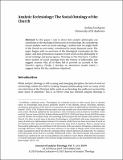Files in this item
Analytic ecclesiology : the social ontology of the church
Item metadata
| dc.contributor.author | Cockayne, Joshua Luke | |
| dc.date.accessioned | 2019-09-09T16:30:02Z | |
| dc.date.available | 2019-09-09T16:30:02Z | |
| dc.date.issued | 2019-07-19 | |
| dc.identifier | 258518599 | |
| dc.identifier | ba4f359d-29a7-4235-9997-0922950383d4 | |
| dc.identifier.citation | Cockayne , J L 2019 , ' Analytic ecclesiology : the social ontology of the church ' , Journal of Analytic Theology , vol. 7 , pp. 100-123 . https://doi.org/10.12978/jat.2019-7.091400021404 | en |
| dc.identifier.other | ORCID: /0000-0002-1545-8247/work/61622260 | |
| dc.identifier.uri | https://hdl.handle.net/10023/18443 | |
| dc.description | The author thanks the Templeton Religion Trust for generous funding during the writing of this paper | en |
| dc.description.abstract | In this paper, I aim to show that analytic philosophy can contribute to the theological discussion of ecclesiology. By considering recent analytic work on social ontology, I outline how we might think of the Church as one entity, constituted by many disparate parts. The paper begins with an overview of the theological constraints for the paper, and then proceeds to examine recent work on the philosophy of social ontology and group agency. Drawing on this literature, I outline three models of social ontology from the history of philosophy and suggest reasons why all of them fail to provide an account of the Church’s agency. Finally, I develop an alternative model which, I suggest, better fits the conditions stipulated. | |
| dc.format.extent | 444091 | |
| dc.language.iso | eng | |
| dc.relation.ispartof | Journal of Analytic Theology | en |
| dc.subject | BT Doctrinal Theology | en |
| dc.subject | T-NDAS | en |
| dc.subject.lcc | BT | en |
| dc.title | Analytic ecclesiology : the social ontology of the church | en |
| dc.type | Journal article | en |
| dc.contributor.institution | University of St Andrews. School of Divinity | en |
| dc.identifier.doi | 10.12978/jat.2019-7.091400021404 | |
| dc.description.status | Peer reviewed | en |
This item appears in the following Collection(s)
Items in the St Andrews Research Repository are protected by copyright, with all rights reserved, unless otherwise indicated.

